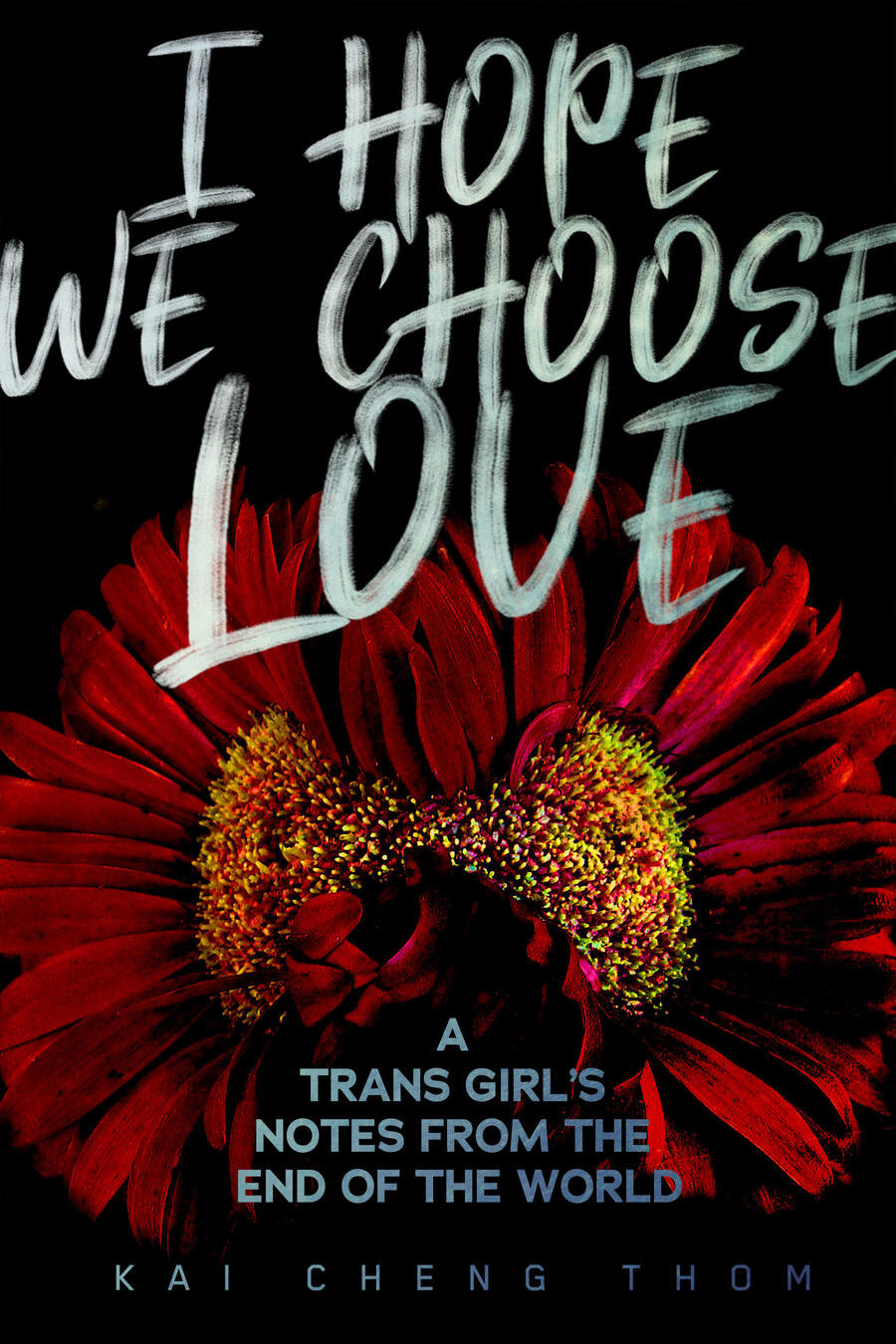Casey Plett Reviews Kai Cheng Thom's I Hope We Choose Love: A Trans Girl's Notes From the End of the World
Kai Cheng Thom. I Hope We Choose Love. Arsenal Pulp Press. $17.95, 155 pp., ISBN: 978-1-551-5275-8
The story is a dream of healing, but it is not healing in and of itself. The spirit must heal itself.
— I Hope We Choose Love, Kai Cheng Thom
This line comes two-thirds through Kai Cheng Thom’s excellent, thought-provoking, urgent essay collection I Hope We Choose Love: A Trans Girl’s Notes From the End of the World. In “A School For Storytellers,” the essay in question, Thom puts forth what for her is a formerly loved concept: the idea of writers, or storytellers in this instance, as all-purpose community members, primed for the work of not just discussing their art but acting as caregivers, mentors, facilitators.
She goes on to describe these assumptions as faulty – it’s all an intoxicating notion to think writers can be that able, but in fact a writer’s obligations of ethics surrounding storytelling do not mean a storyteller is capable of doing this other community work. She notes the doom inherent in expecting more of storytellers than they can give, and, in kind, the danger of storytellers who attempt to perform care when it might not be in their toolset.
Thom ends the essay with a dream of a storytelling school, a quiet mythical place by the sea, where storytellers discuss “why they tell stories, and why people listen to them. They grapple with the purpose of story, the meaning of story...They practise the skills of creating and defending boundaries for themselves and the stories they bring into the world.”
This whole essay is about three pages, and when I was done, marking many lines I wanted to come back to, I put the book down and sat with the essay’s thoughts for a bit. This response is fairly representative of what it is like to read Thom’s book as a whole. She proffers her own past assumptions, details the faults she came to see in them, outlines problems with the current situation at hand, and ends with solutions and ideas that, even when not as literal as a mythical place by the sea, certainly do not read dissimilarly to dreams.
It’s a smart and wise collection, and I’d give it to almost anyone. Many of the essays are specific to queer community, and queer readers (and not necessarily just trans women, I think) will recognize the in-community troubles Thom raises, probably in an intimate and visceral fashion. Yet any reader who’s paid a lick of attention to our terrible world lately will too be grateful for Thom’s insights, from issues like #MeToo to how society conceives of suicide. Queers are centred, the wisdom is intelligible to all.
Her prose is measured, darkly funny, immensely readable, and urgent. In that way, it feels particular to a very trans genre of the blogosphere (I want to say the blogosphere of olde, but that’s probably just a reflection of how I read fewer blogs than I used to.) The early essays of Katherine Cross and Elena Rose in particular share a craft with Thom as trans women of colour whose posts were pointed, elegant, trafficked in a decent level of gallows humour, but most of all offered concrete paths forward and refused to yield to despair.
I use the word “powerful” sparingly when discussing writing, but it applies here. I remember well being a terrified young trans woman reading those blogs of tough, strong women who knew of dark forces, and Thom’s essays reminded me of them. She knows the power that writing has, and yet how that power is also limited.
Interspersed with the essays are very short poems and stories. The essays are what I remember most, but the poems and stories are still nice, acting for me as breaths or pauses in the reading.
I hope everyone picks up this book. It will stay with me for a long time. The line I quoted at the top of the essay is followed with this: “The story is a dream of the revolution, but it is not a revolution on its own. The people must make their own revolutions. The story is a dream of love and the seed of love and a map for love, but it takes people, not stories, to love each other.”
Casey Plett wrote the novel Little Fish, the short story collection A Safe Girl to Love, and co-edited the anthology Meanwhile, Elsewhere: Science Fiction and Fantasy from Transgender Writers. She wrote a column on transitioning for McSweeney's Internet Tendency and her reviews and essays have appeared in The New York Times, Maclean's, The Walrus, and Plenitude, among others.


